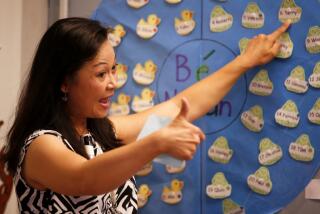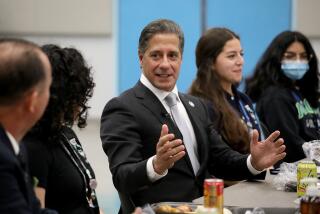Academic success takes more than teachers
- Share via
Re “Better Teachers, but Still Too Few,” April 12
Good teachers make a difference, but other key factors determine the academic success of students -- class size, curriculum restrictions, adequate resources, school and community culture, administrative leadership and, most important, parental involvement. To put all the blame for poor achievement on the shoulders of teachers is an easy scapegoat.
As a new teacher, I find the current system for teacher development, a product of No Child Left Behind, working against me. After two years of night school, interns are expected to survive for several months without a paycheck while doing their student teaching. New policies are making it difficult for teachers to intern on any kind of compensation basis.
We are the first ones cut when schools are overstaffed; we are discouraged from bringing forth any new ideas we picked up in the teacher academy; we receive the cheapest and most worthless continuing education. I am starving for quality professional development. You’ll get “highly qualified” instructors when the bureaucratic decision-makers become “highly qualified” leaders.
STEVEN KENT
Los Angeles
*
There is a simple reason why it is difficult to recruit and retain experienced teachers at high-poverty schools in inner cities. Most teachers, if given the chance, will choose to work at a school where they feel safe and where basic classroom necessities (such as up-to-date textbooks and smaller class sizes) are met.
No amount of teacher training, recognition by the principal or salary bonus will ever replace the burnout felt by a teacher (no matter what the experience level) dealing with the daily problems of overcrowding, student apathy and lack of resources.
I propose a two-part solution. First, provide all children in California schools the basic materials that will help them learn. Second, aggressively recruit and retain more middle and high school African American and Hispanic teachers (who also will be excellent role models) to meet the needs of our diverse population.
Until students feel connected to their schools, they will not become better learners.
TROY GARRETT
Long Beach
More to Read
Sign up for Essential California
The most important California stories and recommendations in your inbox every morning.
You may occasionally receive promotional content from the Los Angeles Times.










